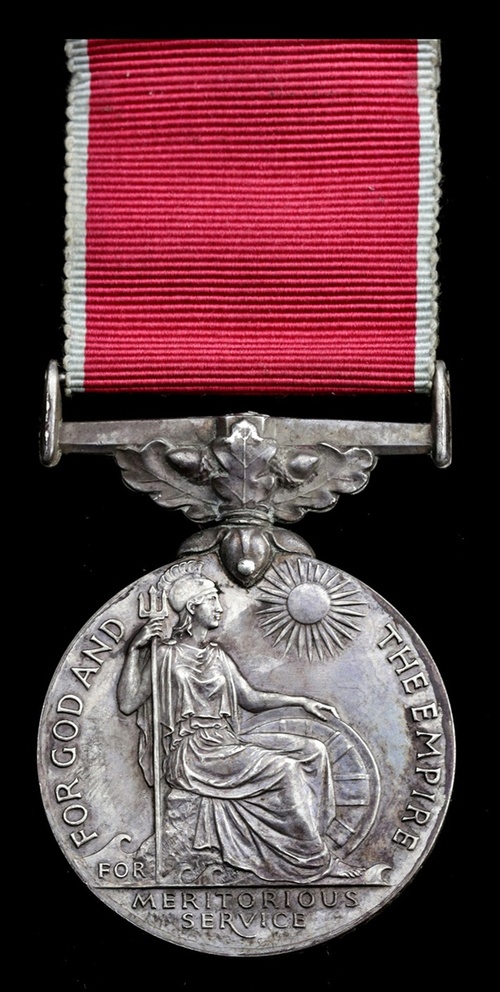
Auction: 17003 - Orders, Decorations and Medals
Lot: 681
An exceptional Second World War B.E.M. awarded to Fireman E. E. Harden, Merchant Navy, who somehow survived the loss of three ships:
The S.S. Harpasa - bombed and sunk by Japanese aircraft off the east coast of India on 5 April 1942
The S.S. Tak Sang - engaged and sunk in a point-blank encounter with a Japanese cruiser on 6 April 1942
The S.S. Fort Howe - torpedoed and sunk by the U-410 off Bougie on 1 October 1943
British Empire Medal, Civil Division, G.VI.R. (Ernest Edward Harden), officially engraved naming, good very fine
B.E.M. London Gazette 10 November 1942:
'The ship [the S.S. Harpasa] was hit by bombs from a Japanese aircraft and caught fire. Although flames had already reached the poop and were spreading fast towards the ammunition, Fireman Harden volunteered to go aft and throw overboard the shells from the poop gun pits. He showed courage and devotion to duty without regard for his personal safety.'
Ernest Edward Harden was born in Birkenhead on 2 February 1920 and entered the Merchant Navy as a Fireman in the summer of 1941.
First time in the drink
A cargo liner of the J. & C. Harrison Line, the S.S. Harpasa departed Calcutta for Mombassa on 1 April 1942. Her crew numbered 39, including Harden and three R.N. gunners. Owing to her slow speed, Harpasa dropped behind her convoy and, making just eight knots, she fell victim to Japanese aircraft in the afternoon of the 5 April. A pair of Zeros delivered two low-level attacks, the second of which proved devastating:
'These same aircraft circled and attacked again from the starboard quarter, this time only passing 150 yards from the stern. I saw them release five bombs and watch them coming towards the ship. All five bombs fell into No. 5 Hold which immediately burst into flames and within two minutes the gunnies and oil stowed in the 'tween decks was blazing fiercely and spreading rapidly aft to the poop. No 5's hatches and beam were blown away and the telemotor steering gear was broken … '
Here, then, as cited above, was the moment Harden stepped forward to jettison ammunition. Having then put up a brave battle to contain the flames, Harpasa's skipper decided to abandon ship:
'The ship was settling and the decks were only 12 feet above water when we abandoned and at 1700 the magazines blew up, disintegrating the after part of the ship. The S.S. Tak Sang, the acting Commodore of the group, was about 15 miles ahead and turned back at 1730. She picked up the complete crew from my boat.'
Second time in the drink
Yet the trials and tribulations of Harpasa's crew were far from over:
'On boarding the Tak Sang we were given quarters for the night and early next morning, about 0645, we were awakened by the alarm bells and were informed that enemy aircraft had been sighted. However, a few minutes later the all clear was sounded and soon afterwards the Captain of Tak Sang told us that he had sighted the British Fleet … '
It was in fact a Japanese fleet:
'I went up on deck and saw one Japanese heavy cruiser on one side and an aircraft carrier with a destroyer on the other and, without warning, the cruiser opened fire at point-blank range. I went to the boat deck and I heard the Captain's order to abandon ship. The Tak Sang's guns did not open fire nor did I see guns fired from any part of the ship. Within a few minutes the ship listed heavily and in eight minutes she sank by the head … I dived overboard and swam round to the other side of the ship where I found three boats and two rafts which had been floated off the ship. I swam to the captain's boat and was pulled into it. All three boats were waterlogged and damaged and I found that five of my crew and 12 crew of the Tak Sang had been killed. Having sunk Tak Sang the Japanese Fleet steamed after the other ships of our group and I believe some 40 ships were sunk in this area. We baled the boats out and patched them up as best we could and rowed ashore, landing on the beach at 1100 on 7 April, from where we had to walk 15 miles to Chitacole, the nearest town. We remained here for 10 days and returned to Calcutta by train.'
Harden was awarded the B.E.M. and Harpasa's skipper, and two ratings, received commendations, one of the latter as a posthumous award.
Third time in the drink
In the summer of 1943, Harden joined the S.S. Fort Howe, bound from Liverpool for North Africa. She was subsequently deployed to Salerno, before commencing her return voyage to the U.K. late September 1943.
At 00.05 hours on 1 October 1943, U-410 fired five single torpedoes at the convoy MKS-26 east off Bougie and observed one ship sinking and heard four more detonations. The resulting report indicated the sinking or torpedoing of four ships totalling 31.000 tons.
In fact, two ships were sunk, the Fort Howe and Empire Commerce. The Master, 49 crew members and 18 gunners from Fort Howe (Master William Williams), Harden among them, were picked up by H.M.S Spiraea (Lt. A. H. Pierce, O.B.E., R.N.R.) and H.M.S. Alisma (Lt. G. Lanning, R.A.N.V.R.) and landed at Bougie. Two gunners were lost.
Harden later served in a merchant shipping pool out of Naples. He was finally discharged from the Merchant Navy in November 1947; sold with copied research.
Subject to 20% VAT on Buyer’s Premium. For more information please view Terms and Conditions for Buyers.
Sold for
£500




